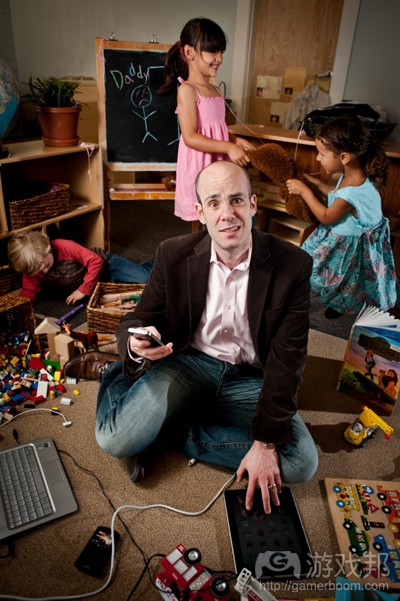研究称电子游戏是良性的儿童教育娱乐工具
作者:Scott Steinberg
家长,政治家以及教育家们总是批评电子游戏既浪费时间,又会让儿童们从健康活动(游戏邦注:如学校活动,户外游戏,体育运动,社会服务等)中分心。但是经过调查,我们发现这种批判是错误的,因为游戏也能够是一种有益,健康且平衡的媒体模式。
除此之外,因为游戏本身具有互动性,所以它与电视等其它被动媒体存在着差异性;如今的儿童电子游戏可以说是推动学习和创造性的最佳工具。不过,尽管游戏具有巨大的潜能,我们同样也需要牢记:只有家长和老师也积极参与其中,游戏才会成为对儿童安全,健康和日常生活有益的内容。
哈佛医学院研究员Cheryl Olson在《父母世界》(游戏邦注:致力于引领育儿生活时尚的杂志)中简要总结道:“适度玩父母认可的电子游戏能够帮助儿童更好地进行学习,社交和体育运动。”Olson的研究包含了一些访问了1000多名公立学校学生后所获得的数据——从中我们可以看到一些表面上看起来无害的游戏(如那些并未特别标注“严肃游戏”或“教育类游戏”的内容)也具有许多值得肯定的优点。
他列举了《塞尔达传说》以及《爆丸小子》等游戏所体现出的益处,如鼓励玩家进行规划,努力解决问题,并发挥自我表达的创造性等。并且Olson也表示《文明》系列等游戏能够激发玩家对于历史和地理的兴趣,而其它游戏也能够鼓励他们进行社交,实践,良性竞争,并培养自己的领导潜质。他还指出,尽管许多家长仍对游戏抱有偏见,但是可以说,现在的游戏已经成为了很多人童年时期以及成长阶段必不可少的组成部分了。
娱乐软件分级委员会(游戏邦注:以下简称ESRB)主席Patricia Vance表示:“游戏当然也能够造福家庭。玩家能够选择各种类型的游戏。很多家长总是认为电子游戏就是一种暴力媒体,而硬核游戏更是明显。但是这些家长们同时也需要清楚,ESRB是目前为止最大的(软件)分级组织,单是去年我们便从1700多种软件中明确了60%的游戏内容,这就意味着有如此多的游戏选择可满足不同年龄层玩家的需求。”
此外,儿童并不是从游戏受益的唯一群体(现在玩家的平均年龄是37岁,成年女性玩家多于青少年男性玩家)。根据美国海军研究办公室(ONR)的研究,电子游戏能够帮助成人更快速地处理信息,基于不同环境做出合理的决策并解决问题。
最近刊登于《Archives of Surgery》上的一篇文章也指出,喜欢玩电子游戏的外科医生能够更加熟练地进行腹腔镜手术。来自罗切斯特大学的脑与认知科学系教授Daphne Bavelier的研究也表明,电子游戏玩家在体验一些特定游戏后再投入工作中时,定能够体现出更高的关注度,精确率,想象力以及多重任务的执行能力。马利马克学院的心理学教授Michael Stroud也证实了这一点,他解释道,游戏中所要求的积极关注与工作记忆也能够帮助我们更好地执行现实世界中复杂的任务。
除此之外,专家们也表示,严肃游戏和虚拟环境可能成为未来的一种学习模式。学生将会发现游戏比传统的教学或PPT展示更容易理解且更具有吸引力,所以他们喜欢这种方法。同时,模拟游戏将让学生们能够在一个有趣且逼真的环境中进行选择,研究结果,并在一种实时环境下进行学习。美国科学家联盟(FAS)表示,儿童们应该更多地接触电子游戏(而不是更少)。玩游戏能够帮助员工更好地应对全球范围的激烈工作竞争,该组织还指出游戏能够推动人们进行策略性思考,互动式分析,计划构想,并提高人们的应变能力。
而这些能力恰好是当今雇主们在招聘时所看重的内容。不论是思科,IBM,NASA还是北电网络,许多政府和公司领导们越来越看重游戏化原则对生产力,销售以及工作满意度的影响。根据娱乐软件协会的研究,有将近80%的主要雇佣企业打算在2013前执行互动式软件和基于游戏的培训计划。
暂且不说那些基于教育和传达信息的“严肃游戏”,即使是《舞蹈中心2》这种常规游戏也能够鼓励整个家庭聚在一起,分享游戏的乐趣。除此之外,游戏中许多交织的正面信息也能够提升玩家的道德行为和社交行为。例证:在《个性与社会心理学杂志》所列举的一些实验中,研究人员发现那些参与“正面社交”游戏(即角色会在游戏中相互合作)的玩家比起那些只是玩“中立”游戏(游戏邦注:如《俄罗斯方块》之类的游戏)的玩家拥有更强的互助行为。许多户外活动,包括社交游戏和大部分的多人游戏,也会鼓励玩家进行更多的合作互动并提高他们的团队精神。而其它游戏,特别是受动作控制的游戏,如Wii,Wii U,PlayStation Move以及Xbox 360的Kinect等平台上的游戏也能够推动儿童迅速起床“做运动”。
事实上,要创造安全有趣,且能够成为玩家日常生活重要部分的游戏,最佳方法便是吸引家长们也加入游戏。亲身实践一款特别的游戏不仅能够帮助家长获得更多信息,同时他们也能够进一步了解各种系统/游戏所提供的能力和潜在使用环境。如此不但能够鼓励儿童玩游戏,也能够推动不同年龄层的玩家共享游戏,培养不同代人之间的交流与理解。通过培养儿童对游戏的兴趣,就像对数学或科学等学科的兴趣一样,能够帮助这些小玩家们从不同角度重新认识游戏世界,将游戏当成是一种有益的模式。但是我们也需要记住:必须平衡游戏与其它低科技色彩的活动(如体育运动,阅读,亲近自然等)的时间,而家长也必须事先教育儿童这种特殊媒体所存在的潜在弊端。
总之,家长们必须清楚:电子游戏是儿童们一种很棒的消遣活动,也是全家人都可以参与的活动。并且与其它家长教育内容一样,这种高科技爱好也需要家长的以身作则。如果你能够引导儿童们进行安全,健康且适当玩游戏,那么你们全家人就能够在这个虚拟世界中体验到无穷乐趣。
(本文为游戏邦/gamerboom.com编译,拒绝任何不保留版权的转载,如需转载请联系:游戏邦)
Kids and video games: Why children should play more
Scott Steinberg
Parents, politicians, and educators often criticize video games as a waste of time that distract kids from healthier activities such as school, outdoor play, sports, and community service. Just one problem: Research is quickly proving the theory wrong and illustrating that gaming can be a beneficial and well-rounded part of a healthy, balanced media diet.
Moreover, due to their interactivity, at odds with passive mediums such as television, kids’ video games can actually be one of today’s most powerful tools for sparking learning and creativity. But while gaming offers tremendous potential, it also bears remembering: It takes a running commitment from parents and teachers to actively follow and participate in the pastime to make it a truly safe, healthy, and rewarding part of household life.
As Harvard Medical School researcher Cheryl Olson, ScD succinctly summarizes in Parents magazine, “Parent-approved video games played in moderation can help young kids develop in educational, social, and physical ways.” Olson’s work, which included surveying data from interviews with over 1,000 public-school students, clearly illustrates the many upsides offered by even seemingly innocuous titles — i.e., not those labeled specifically as “serious games” or “edutainment.”
Among the findings she cites are the marked benefits of outings like the Legend of Zelda and Bakugan games, which encourage planning, problem solving, and creative self-expression. Olson also says games such as the Civilization series can spark interest in history and geography, while others encourage socialization, exercise, healthy competition, and leadership. Curiously, she points out, many parents still fixate on the negative aspects of gaming, when in fact the hobby — and many high-profile selections — are now a normal, intrinsic part of childhood and growing up.
“Games can definitely be good for the family,” says Entertainment Software Rating Board (ESRB) president Patricia Vance. “There’s plenty of selection. Oftentimes I think parents feel that they’re not because video games in the media are portrayed as violent, and hardcore games tend to get the lion’s share of publicity. But parents also need to be comforted knowing that E for Everyone is by far largest category [of software]. Nearly 60% of the almost 1700 ratings we assigned last year were E for Everyone, which means there’s a huge selection of games available that are appropriate for all ages.”
What’s more, kids aren’t the only ones who stand to benefit from button-mashing (and not just because the average player is now 37 years old and more adult women play than teenage males). Research from the Office of Naval Research (ONR) actually indicates that video games can help adults to process information much faster and improve their fundamental abilities to reason and solve problems in novel contexts.
A study published in a recent edition of Archives of Surgery also says that surgeons who regularly play video games are generally more skilled at performing laparoscopic surgery. Findings by Daphne Bavelier, a professor of brain and cognitive sciences at the University of Rochester, likewise reflect that video gamers show real-world improvements on tests of attention, accuracy, vision, and multitasking after playing certain titles. No surprise there, confirms Michael Stroud, a professor of psychology at Merrimack College, who explains that games’ active demands on our attention and working memory all map well to performing similarly complex real-world tasks.
What’s more, experts say, serious games and virtual environments may be the future of education. Not only do students find gaming more approachable and engaging than lectures and PowerPoint presentations, they insist on them. Simulations also provide a more inviting and lifelike context in which to make choices, see results, and apply learning in real-time. The Federation of American Scientists (FAS) states that kids actually need more, not less, video game play as a result. Citing games’ ability to prepare workers for the increasingly competitive global job market, the organization says that games promote strategic thinking, interpretative analysis, plan formulation, and ability to respond to change.
Ironically, these are the same talents employers now demand from prospective recruits. From Cisco to IBM, NASA to Nortel, government and corporate leaders are increasingly turning to principles of gamification to enhance productivity, sales, and job satisfaction. According to an Entertainment Software Association study, nearly 80% of major employers plan to implement interactive software and games-based training by 2013.
Setting aside so-called “serious games” titles specifically designed to teach and inform, even average, everyday outings such as Dance Central 2 encourage families to spend time together and bond over shared interests. Many also interweave positive messages into play that promote ethical and social behavior. Case in point: In a series of experiments published in the Journal of Personality and Social Psychology, researchers found that participants who had just played a “pro-social” game wherein characters cooperate as compared to those who had just played a “neutral” game (e.g., Tetris) were more likely to engage in helpful behaviors. Many outings — including social and massively multiplayer games of all stripes — likewise encourage cooperation and teamwork. Others, especially motion-controlled titles for the Wii and Wii U, PlayStation Move, and Xbox 360’s Kinect, prompt kids to get up off the couch and exercise.
In fact, the best way to make games a safe, fun, and enriching part of everyday life is for parents to take an active interest and involvement in the hobby. Not only does a willingness to go hands-on with specific games and consoles help caregivers stay more informed, they can better understand the capabilities and potential usage contexts various systems/titles offer. It also proves encouraging to children, provides a shared activity all ages can come together over, and fosters greater communication and understanding across generations. From providing safe escapes to fostering interest in subjects like math and science and helping kids see the world from different perspectives, games can be beneficial. But it bears remembering: Like any form of screen time, games should also be balanced with other low-tech activity — playing sports, reading a book, enjoying nature, etc. — and parents should proactively educate kids to potential dangers surrounding the medium.
Ultimately, rather than fixate on sensationalized issues, adults would do well to remember: Video games can be a wonderful pastime for children — one that families should embrace. As with more traditional aspects of parenting, though, finding success with the high-tech hobby requires leading by example. Teach kids safe, healthy, and positive computing habits, and the virtual world will be the whole family’s joy to discover.(source:venturebeat)









































 闽公网安备35020302001549号
闽公网安备35020302001549号